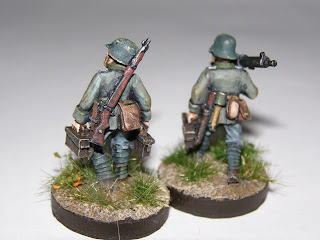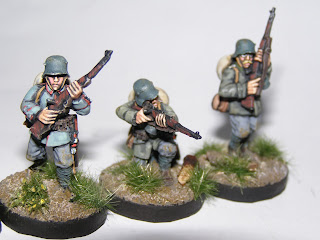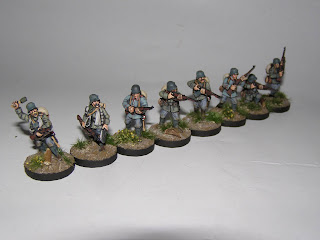This German Platoon is now nearly complete other than 2 x JNCO's/senior Privates to run two of the sections. I also have some figures to paint to complete some support sections, such as the Granatenwerfer and an assault bombing section.
I was greatly assisted by this idea which I saw on one of the blogs, but I cannot recall who it was (sorry!). I have magnetic sheet on the floor of the box and also on the bases of the figures. By printing an organisation sheet with relevant gaps in the Sections, I was able to focus much more clearly on what I was trying to achieve (and see which figures I had done).
The above picture focuses mostly on the supports and the picture below on the platoon of the 246th Reserve Regiment that I was re-creating. (Blogger seems to post everything in reverse order now - took 3 attempts and still it was backwards!)
These machine gunners are left over but are bound to find a home in another Platoon.
I have used a colour coding method to match the coloured marks on the organisation sheet in the storage box, the two lines signifying 2nd Platoon.
Above and below is the LMG section comprising riflemen and an LMG team.
I have painted up 2 bombers for each Section. Finding accurate information of how the 1918 German Platoons was formed appears hard to find. The Too Fat Lardies have produced supplements with some good information and this does seem to emphasise that by mid- 1918 there were no hard and fast rules anymore.
Manpower shortages would no doubt have caused constant change. It appears that were generally 4 sections in a Platoon but an extra bombing section and a Granatenwerfer section could also be added in some regiments and in other regiments the organisation might have been different again. A complex topic which I won't go into too much detail with here.
The figures are again by Great War Miniatures and contain the earlier tunic as well as the later Bluse with hidden buttons under the front flap. This allowed some playing with shades again, which adds interest and reflects the fabric supply shortages by late war.
I intend using the Chain of Command rules as re-written for WW1 in one of the Too Fat Lardies supplements. The leaders take on a major importance so need to be visible when playing as their location on the battlefield is important. I used a simple method of using a red brown for the bases of officers, a dark buff for SNCO's and a dragoon green for JNCO's. This was a lesson learned from playtests when I found that I was playing hunt the leader and spot the rank badges every turn.
I felt slightly sorry for the figure below. I was short of an SNCO so had to demote an officer. As an officer he was slightly redundant and left over, but as a Vize-Feldwebel he will now be playing an important role in getting his men motivated and moving. From my research it appears that the Vize-Feldwebel was one of those ranks which was senior enough to have officer accoutrements (such as belt, sword-knot etc) issued (rather like modern British Army Warrant Officers who often find themselves saluted due to wearing so many officer uniform distinctions). It seems the Germans did similar.
Anyway, my new Vize-Feldwebel appears to be a man of action so will hopefully be pleased with his new role.
More officers above and below.
That might be all of my WW1 painting for the time being. I have ordered a Whippet tank from 1st Corps, but I will probably paint something completely different in the meantime. I have no idea what yet...and that's part of the fun of it all.

































Great, Great War work, Jason!
ReplyDeleteHi Jonathan, Many thanks for your kind comment.
DeleteBest wishes,
Jason
That's a lot of great looking WW1 Germans, Jason! Nice way to ring in the new year!
ReplyDeleteThanks Dean, I always seem to think of WW1 around Christmas/New Year. I think its something to do that Paul McCartney (The ex-Beatle) doing 'Pipes of Peace' set in WW1 many years ago. I was a child when I saw it but still seem to associate it. It's quite funny seeing Paul McCartney as a German complete with moustache on the music video too...sorry I digress! Best wishes, Jason
DeleteSUperb details and great painting Jason!
ReplyDeleteThank you for your kind comment Phil,
DeleteBest wishes,
Jason
Nice job, Jason. I don't play that style (or era!) of game, but the organization sheet seems a useful idea!
ReplyDeleteHi Peter, Thanks, yes the organisation sheet...that is one thing that I will be using a lot from now on. It should make setting up for a game as well as planning my painting, so much easier.
DeleteBest wishes,
Jason
Happy New Year Jason - you have certainly done a magnificent job on these late WW1 Germans.
ReplyDeleteHappy New Year Keith, thank you for your kind comments. I'm glad you like them.
DeleteBest wishes,
Jason
Jason,
ReplyDeleteThose look great! Nicely done.
Neil
Hi Neil,
DeleteThank you for your kind comment, I'm glad you like them.
Best wishes,
Jason
Nice work Jason, I play hunt the leader in my WWI collection by having my officers and NCO's on 30mm bases and everybody else on 25mm bases.
ReplyDeleteHi Paul, Thanks for your kind comment. Having different sized bases is a great idea. I use that one with some different eras like ACW and ECW where I can put on extra staff figures for extra effect.
DeleteBest wishes,
Jason
A sensational squad! Brilliant every one of them.
ReplyDeleteRegards, James
Thanks James, I'm glad you like them :-)
DeleteBest wishes,
Jason
Gorgeous looking Germans and smart organisation!
ReplyDeleteBest Iain
Thanks Iain, they really were great to paint.
DeleteBest wishes,
Jason